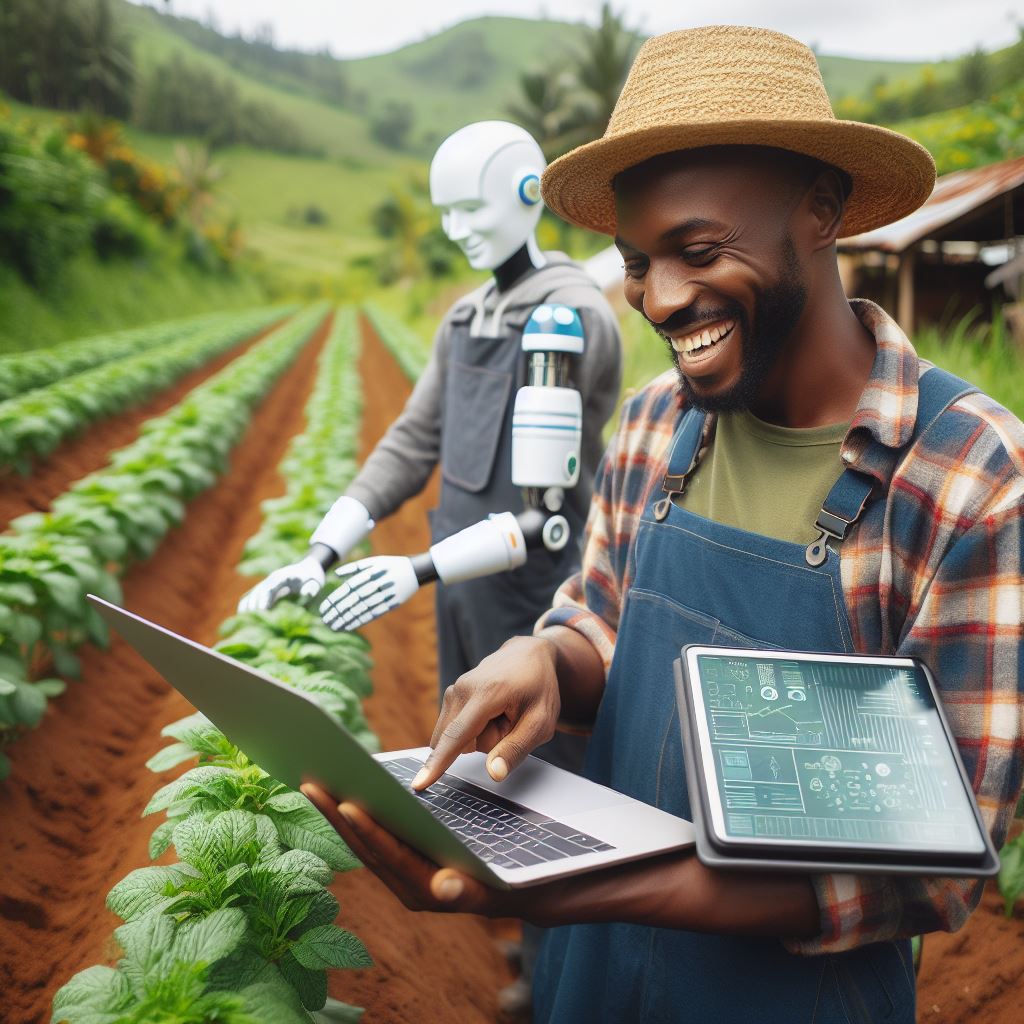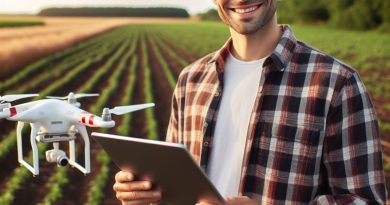AI in Farms: Precision Agriculture’s Rise
Last Updated on February 19, 2024
Introduction
As we explore “AI in Farms Precision Agriculture” enables farmers to make data-driven decisions, resulting in cost reduction, increased crop yield, and sustainable farming techniques.
AI in farms refers to the use of artificial intelligence technologies in agricultural practices to enhance efficiency and productivity.
It involves the application of advanced algorithms and data analytics to make informed decisions.
Precision agriculture plays a crucial role in optimizing farming practices by adopting AI technologies.
In this blog post, we will explore the rapid rise of AI in farming and its impact on the agricultural industry.
We will discuss the various applications of AI, the benefits it brings, and the challenges faced in its implementation.
The benefits of AI in precision agriculture
Precision agriculture, also known as smart farming, has been revolutionized by the integration of artificial intelligence (AI) technologies.
AI is transforming traditional farming practices by providing farmers with advanced tools and analysis techniques to make informed decisions.
This section will discuss the benefits of utilizing AI in precision agriculture.
Increased efficiency and productivity
One of the significant advantages of AI in precision agriculture is the increased efficiency and productivity it offers.
By automating time-consuming tasks, such as monitoring, data collection, and analysis, farmers can allocate their time and effort to more critical activities.
They can focus on strategic decision-making, planning, and implementing effective agricultural practices that lead to higher yields and improved overall efficiency.
Accurate data analysis plays a vital role in decision-making for farmers.
AI algorithms can analyze vast amounts of data collected from sensors, drones, satellites, and other devices in real-time.
This analysis provides valuable insights into various aspects of farming, including soil health, weather patterns, crop growth, and livestock conditions.
By obtaining actionable intelligence, farmers can make informed choices regarding crop selection, planting strategies, irrigation schedules, pest and disease management, and nutrient application.
Resource optimization and sustainability
AI in precision agriculture offers significant benefits in terms of resource optimization and promoting sustainable farming practices.
By integrating AI-based technologies, farmers can reduce water, fertilizer, and pesticide usage, minimizing their environmental impact.
AI algorithms can analyze and predict crop water requirements based on soil moisture levels, weather forecasts, and plant physiology.
This enables farmers to apply water precisely and avoid wastage, resulting in better crop growth, improved water conservation, and reduced costs.
Similarly, AI helps farmers optimize fertilizer usage by analyzing soil nutrient levels, crop requirements, and growth patterns.
By providing accurate recommendations, AI technology enables farmers to apply fertilizers efficiently, avoiding excess usage and potential groundwater contamination.
AI algorithms can also predict and detect pest infestations and diseases at an early stage, enabling farmers to implement targeted and timely control measures.
This reduces the need for excessive pesticide usage, minimizing harmful effects on the environment and promoting sustainable pest management practices.
Improved crop health and yield
- AI-powered monitoring systems have transformed crop health management in precision agriculture.
- Real-time monitoring using sensors, cameras, and drones allows farmers to continuously track crop growth, environmental conditions, and potential stress factors.
- This early detection of diseases, pests, nutrient deficiencies, or adverse weather conditions allows farmers to take immediate action to protect and improve crop health.
- With the help of AI, farmers can customize treatments based on specific crop requirements and field conditions.
- AI algorithms factor in various variables like crop type, growth stage, soil conditions, and weather patterns to determine the optimal treatment plans.
- These tailored treatments ensure that resources like fertilizers, pesticides, and water are applied precisely where and when needed, minimizing waste and improving crop yield.
In short, AI in precision agriculture offers significant benefits for farmers, the environment, and overall food production.
Increased efficiency and productivity, resource optimization, and improved crop health are just some of the advantages AI brings to the field.
As AI technologies continue to evolve and become more accessible, precision agriculture will further advance, leading to sustainable farming practices, higher yields, and enhanced profitability for farmers.
Read: Automated Shepherding: The New Age
AI technologies used in precision agriculture
Precision agriculture has embraced various AI technologies to revolutionize farming practices.
These technologies enable farmers to enhance crop yields, minimize resource wastage, and improve overall farm efficiency.
In this section, we will explore the key AI technologies utilized in precision agriculture.
Internet of Things (IoT) devices and sensors
- Remote monitoring of environmental conditions: In precision agriculture, IoT, a crucial AI technology, provides real-time data on temperature, humidity, and sunlight, aiding farmers’ decisions.
- Collection of data on soil moisture, temperature, and more: Furthermore, IoT devices collect data on soil moisture, temperature, and other parameters, aiding farmers’ understanding and adjustments for crop growth.
Machine learning algorithms and analysis
- Processing and interpreting the collected data: Machine learning algorithms process data from IoT devices, sensors, and other sources to identify patterns and trends.
- Predictive analytics for optimized outcomes: Machine learning algorithms analyze data to predict crop yields, optimize irrigation, and detect diseases or pests in advance.
Robotics and automation
- Autonomous machinery for various farming tasks: Autonomous machinery performs farming tasks with minimal human intervention, including planting, harvesting, and spraying pesticides.
- Robotic systems for planting, harvesting, and maintenance: Maintenance robots autonomously monitor and remove unwanted plants, optimizing crop growth and reducing manual labor.
In a nutshell, AI technologies have played a crucial role in the rise of precision agriculture.
The Internet of Things devices and sensors enable remote environmental monitoring and data collection, while machine learning algorithms process and interpret this data for optimized outcomes.
Robotics and automation further enhance farming operations by enabling autonomous machinery to perform various tasks.
By embracing these AI technologies, farmers can achieve higher yields, minimize resource wastage, and create sustainable and efficient farming practices.
Read: Crop Monitoring: Tech for Better Yield

Case studies on successful implementation of AI in farming
Example 1: Tehama Ranch
Description of the farm and its challenges
Tehama Ranch is a large-scale cattle ranch located in Northern California.
The ranch spans over 10,000 acres and faces several challenges in managing its livestock, such as tracking individual animal health and optimizing grazing patterns.
AI solutions implemented and outcomes achieved
To address these challenges, Tehama Ranch implemented AI-powered livestock monitoring systems.
These systems utilized smart tags and sensors to track animal behavior, health indicators, and location data.
By collecting and analyzing this data, the ranch was able to implement proactive healthcare measures and improve grazing management.
This led to a significant decrease in livestock health issues and improved overall operational efficiency.
Example 2: Iroquois Valley Farms
Overview of the agribusiness and its goals
Iroquois Valley Farms is an organic farmland investment company that supports sustainable agriculture.
Their primary goal is to provide land access and financial resources to organic farmers while promoting regenerative farming practices.
How AI technology enhanced their operations and profitability
- Iroquois Valley Farms incorporated AI technology to optimize various aspects of their operations.
- This included using machine learning algorithms to analyze soil data, weather patterns, and crop yield predictions.
- By integrating AI-based analytics, they were able to make data-driven decisions, improve resource allocation, and increase crop yield.
- This led to enhanced profitability for both the farm and the farmers they support.
The successful implementation of AI in these case studies showcases the potential and benefits of precision agriculture in the farming industry.
By leveraging AI technologies, farms can overcome various challenges, improve productivity, and achieve sustainable growth.
Read: E-Health for Cattle: Tech Advancements
Challenges and Concerns Regarding AI in Farms
The rise of AI in precision agriculture brings numerous advantages, but it also presents several challenges and concerns that need to be addressed.
This section will explore the primary challenges and potential solutions related to the implementation of AI in farming.
Cost of Implementation and Accessibility
- Initial investment and ongoing expenses: The cost of implementing AI in farms poses a significant challenge, limiting accessibility for all farmers.
- Unequal access for small-scale farmers: Small-scale farmers may struggle to access and afford AI technologies due to high costs, creating inequalities.
Data Security and Privacy
- Protection of sensitive farm data: Implementing AI in farms requires considering data security and privacy due to the collection of sensitive farm data.
- Potential risks of hacking or misuse: Storing and transmitting sensitive farm data carries inherent risks, including unauthorized access attempts by hackers or malicious entities.
Ethical Considerations and Impact on Labor Force
- Job displacement and retraining needs: AI adoption in farms prompts ethical considerations, especially concerning its effect on the labor force, potentially displacing workers.
- Ensuring fair and responsible use of AI technology: Furthermore, it’s crucial to ensure fair and responsible AI use, prioritizing transparency, accountability, and equity.
Basically, while AI in farms offers significant benefits, some challenges and concerns need to be carefully addressed.
The cost of implementation and accessibility to AI technologies must be made more feasible for all farmers, including small-scale operations.
Data security and privacy measures should be implemented to protect sensitive farm information from potential threats.
Additionally, ethical considerations surrounding job displacement and the responsible use of AI technology should guide the adoption of AI in farms.
By addressing these challenges and concerns, the potential of AI in precision agriculture can be fully harnessed for sustainable and efficient farming practices.
Read: Irrigation Tech: Saving Water in Farming
Conclusion
AI in precision agriculture has gained significant momentum in recent years.
AI technologies provide valuable insights for optimizing crop production and livestock management. It can enhance resource efficiency, crop quality, and overall profitability.
Examples of AI applications in agriculture include automated machinery, drone surveillance, and data analytics.
AI has the power to transform traditional farming methods into smart, data-driven systems.
By harnessing AI capabilities, farmers can make informed decisions and enhance their output.
Farmers should actively seek opportunities to integrate AI tools into their farming practices.
By embracing AI, farmers can stay competitive, increase productivity, and contribute to sustainable food production.
Ultimately, AI in farms holds immense potential for revolutionizing agriculture.
As AI technologies continue to advance, the agriculture industry should eagerly adopt and explore their capabilities.
By using AI technologies, farmers can improve efficiency, reduce waste, and ensure long-term sustainability.


